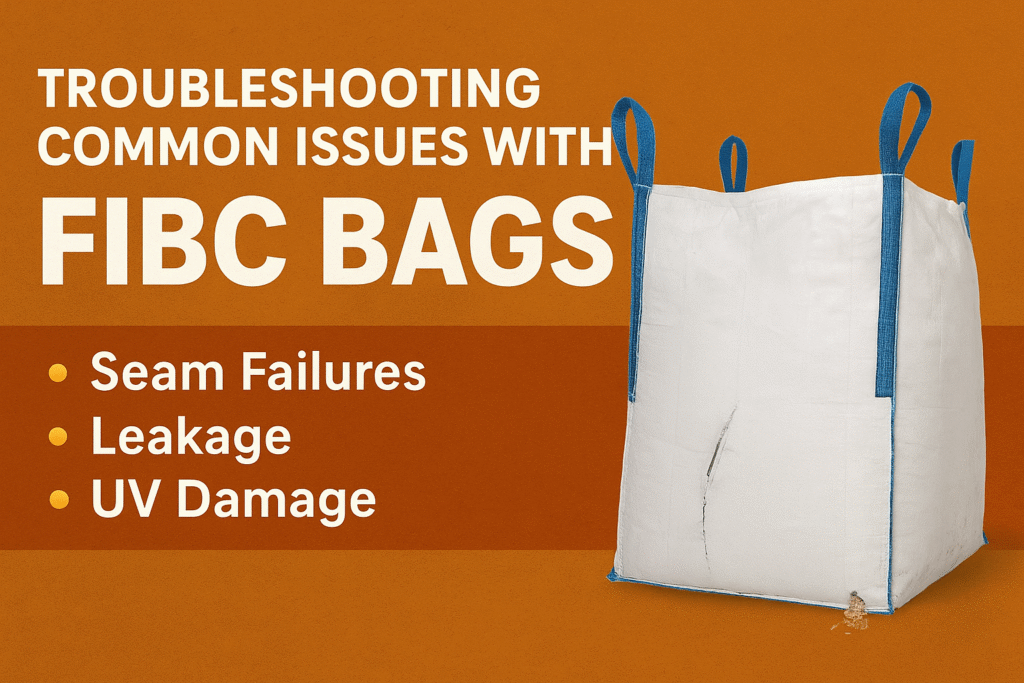Getting Star
Bulk bags, also known as FIBC bags or jumbo bags, are used a lot in industries including farming, building, and chemicals. They can safely carry a lot of stuff, but even the strongest bag can have problems if you don’t take care of it.
You know how annoying it can be when bags rip at the seams, leak, or become damaged by the sun. The good news is Most of these issues can be avoided. We’ll teach you how to find typical FIBC problems, what causes them, and how to keep your bags in great shape in this article.
1. Why do bags split at the seams and how to stop it
What occurs is that the sewn seams of a bag might break, and the stuff within starts to fall out.
Why it happens:
- Putting too much stuff in the bag over its recommended limit
- Stitching that is weak or of poor quality
- Abrasion while lifting, stacking, or moving
How to catch it early:
- Before you use the bag, run your hands along the seams.
- Check for threads that are coming apart or small gaps.
Ways to keep seams from failing:
- Follow the bag’s weight restriction. Don’t try to put too much in there.
- For heavy things, use bags with double stitching or seams that are stronger.
- Change out bags that are starting to wear out before they break.
2. Leakage: When Your Stuff Gets Out
What happens: Small holes or weak spots let powders or granules get out, making a mess and wasting materials.
What causes it to happen:
- Things with sharp edges in the bag
- Handling roughly while filling or emptying
- Pinholes and other manufacturing flaws
How to spot it early:
- Look for small bits of dust at the base and in the corners.
- Check the bag for holes or weak points before you fill it.
How to stay away from it:
- Use liners for small powders.
- Teach your crew how to handle baggage with care.
- Don’t pull bags across rocky ground.
3. UV Damage: Keep Your Bags Safe from the Sun
What happens: Polypropylene fibres can become brittle when they are exposed to sunlight for a long time, which makes them less strong and flexible.
Why it happens:
- Leaving bags outside for a long time
- Not employing material that protects against UV rays
How to find it:
- Colour that has faded or a texture that is fragile
- Weak places that break readily when raised
How to stop it:
- Whenever you can, keep baggage inside or in the shade.
- Use FIBC bags that protect against UV rays when storing things outside.
- To keep your bags sturdy, don’t let them get too much sun.
4. How to Keep FIBC Bags in Great Shape
- Check your bags before and after each usage.
- Follow the suggested weight limitations.
- To avoid rubbing, stack and store bags the right way.
- Use the right tools, like forklifts or cranes with gentle loops, to move things.
- Keep an eye on how often you use your bags and get rid of them when they start to wear out.
5. Examples from Real Life
- Seam Failures: A fertiliser firm added double stitching to their bags to make them less likely to break during shipping.
- Leakage: Cement workers began using liners to keep the powder from overflowing.
- UV Damage: Grain storage places shifted to bags that were protected from UV rays and kept them out of the sun, which kept the bags strong year after year.
6. Picking the Right FIBC Bag
Not every bag is the same. To avoid problems that happen a lot:
- Choose the proper loop type for your lifting equipment: single, double, or four-loop.
- Pick the right fabric thickness and coatings for your material.
- For outdoor storage, use bags that protect against UV rays.
- Think about customising your product, storage, and transportation needs.
Final thoughts
Seam failures, leaks, and UV damage happen a lot, but they don’t have to be an issue if you take care of them. You may save time, money, and trouble by regularly checking your FIBC bags, handling them correctly, and picking the right one.
We at DITAN: Disha Jute & Allied Products Pvt. Ltd. offer FIBC solutions that are strong, high-quality, and can be tailored to fit your needs. They will protect your goods every step of the way.
Contact us immediately so we can help you identify the best FIBC solution for your business.

